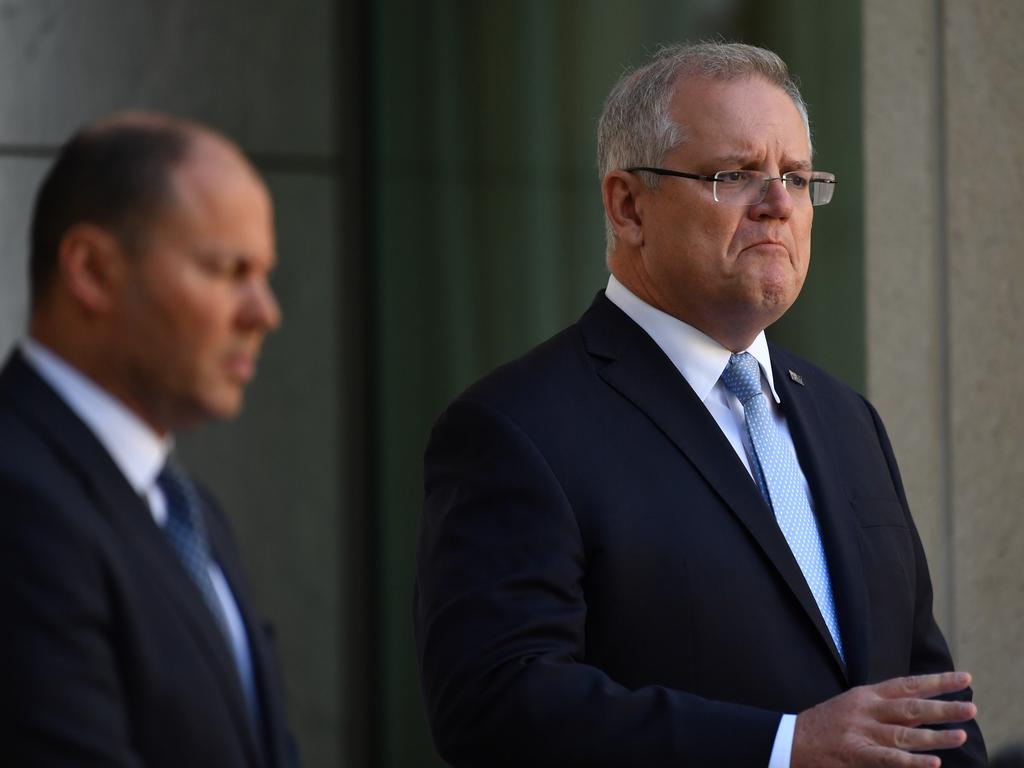Coronavirus: Funds to take more of our wages? Tell ’em they’re dreaming
The super sector was blindsided by the government’s decision to allow households access to up to $20,000 in super.

The super sector, expecting a much smaller sum, was blindsided. Treasury estimates up to $27bn of the $3 trillion savings stockpile could be withdrawn to help people meet their expenses.
The Treasurer has made the right decision — leaning on super is better than resorting to yet more debt and, later, taxation to help prop up the economy in a crisis. And a brave one, too, given the sector, especially the union-backed industry funds, is probably the most powerful vested interest in the country.
He should go further and consider asking businesses to pay super contributions as wages until the end of the year. Super payments are remitted quarterly rather than monthly or fortnightly, but the payroll transformation is surely manageable, and definitely worth it.
It would boost take-home wages significantly, allowing households to pay down debt or boost consumption, and critically provide the government with revenue. People spending their own money is preferable to churning it through the bureaucracy to be spent in ways politicians prefer.
The federal government alone is ratcheting up billions in additional spending, none of it investment. Direct stimulus — all covered by debt — grew from $17.6bn to $66.4bn in a week, not to mention the other $126bn in loans and guarantees to small businesses that ultimately might turn bad.
At the same time, revenues are about to plummet, leaving an extraordinary hole in public finances that threatens economic growth for a generation.
Yet the federal government is haemorrhaging $19bn a year in forgone tax in compulsory superannuation contributions. Now more than any time since World War II it needs this cash. It certainly needs it a lot more than the bloated funds management sector, where the ratio between pay and intrinsic value added is perhaps higher than any industry.
Surely the $30bn a year in fees creamed off last year is enough during a time of crisis?
There is precedent overseas for changing the compulsory contribution rate. Singapore’s Central Provident Fund, a superannuation-style national saving scheme into which employers and employees are bound to contribute, is looked upon jealously by our super sector. The contribution rate is about 20 per cent, although savings can be accessed before retirement for housing and medical expenses. Singapore slashed the rate in half during a 1986 recession.
On Monday Deutsche Bank conservatively put the two-year deficit at $61bn, conceding it was likely to be larger. That’s a significant trashing of the national balance sheet in a short time.
The budget repair levy will be remembered almost fondly, as governments are compelled to jack up taxes. That levy, imposed on incomes above $180,000 for three years to June 2017, raised just $1bn a year, compared with $190bn of support so far.
It’s not necessarily true workers are missing out on cheap share prices either. When last valued in late December, superannuation assets totalled $2.95 trillion. Funds overseen by the Australian Prudential Regulation Authority, which have the overwhelming bulk of members and about $2 trillion in assets, had $991bn in equities. They have lost about $330bn in value this year, given similar plunges in markets globally.
The Dow Jones didn’t get back to its 1929 level, when the US stockmarket crashed, until 1954. Stocks throughout the 1970s delivered poor returns. Even if it were to bounce back in years to come, the utility derived from the funds now might be far higher than when we are older and more comfortable.
Suspending contributions to funds might be a better option even than allowing early access. Some funds might struggle with the flood of applications. Super funds aren’t banks, they can’t borrow and they can’t create credit out of thin air. Forcing funds to sell assets could add to existing dislocation on equity and bond markets.
Publicly, funds have expressed confidence they’ll be able to meet demand, and the Treasurer points out they collectively have hundreds of billions in cash.
Hostplus and REST, whose 3.2 million member accounts are held by workers overwhelmingly in retail and hospitality, will face the lion’s share of the withdrawal claims. Hostplus, with about $46bn in total assets, has only about $2.2bn in cash. Indeed its chief investment officer in late 2018 boasted how little cash the fund had.
“We have a zero allocation to fixed interest and a zero allocation to cash,” he told a trade magazine. “Our growing allocation to alternatives is to ensure we remain flexible and adaptive, given we have such a high allocation to unlisted assets,” he added. It remains to be seen how flexible these funds are as contributions dry up at the same time.
If the emerging economic crisis deepens, as seems likely, throwing hundreds of thousands out of work and tearing at our social fabric, historians may marvel at the power of the superannuation industry to maintain its privileges in the face of common sense.
Our public sector debt is relatively modest. Yet as a nation our foreign debt is massive, our energy prices, wages and taxes high. We are not well positioned economically entering this. No wonder our currency is at parity with the New Zealand dollar, having fallen more than most other currencies. If we can limit our borrowing we should.
Never mind all this, says the super sector. Next year we’d also like government to start cutting take-home pay by 2.5 per cent, just as we’re emerging from what could be the biggest recession since at least the early 1990s.
Tell ’em they’re dreaming.








“This is the people’s money and this is the time they need it most,” Josh Frydenberg declared last weekend, signalling the government would allow households severely affected by the recession to access up to $20,000 of superannuation.